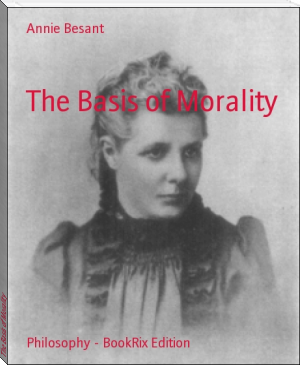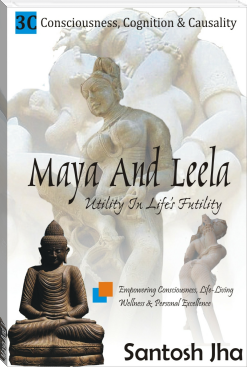The Basis of Morality, Annie Besant [romantic love story reading txt] 📗

- Author: Annie Besant
- Performer: -
Book online «The Basis of Morality, Annie Besant [romantic love story reading txt] 📗». Author Annie Besant
We may admit that, as a matter of historical and present fact, Utility has been everywhere tacitly accepted as the basis of morality, defective as it is as a theory. Utility is used as the test of Revelation, as the test of Intuition, and precepts of Manu, Zarathushtra, Moses, Christ, Muhammad, are acted on, or disregarded, according as they are considered to be useful, or harmful, or impracticable, to be suitable or unsuitable to the times. Inconsistencies in these matters do not trouble the "practical" ordinary man.
The chief attack on the theory of Utility as a basis for morality has come from Christians, and has been effected by challenging the word "happiness" as the equivalent of "pleasure," the "greatest number" as equivalent to "individual," and then denouncing the maxim as "a morality for swine". "Virtue" is placed in antagonism to happiness, and virtue, not happiness, is said to be the right aim for man. This really begs the question, for what is "virtue"? The crux of the whole matter lies there. Is "virtue" opposed to "happiness," or is it a means to happiness? Why is the word "pleasure" substituted for "happiness" when utility is attacked? We may take the second question first.
"Pleasure," in ordinary parlance, means an immediate and transitory form of happiness and usually a happiness of the body rather than of the emotions and the mind. Hence the "swine". A sensual enjoyment is a "pleasure"; union with God would not be called a pleasure, but happiness. An old definition of man's true object is: "To know God, and to enjoy Him for ever." There happiness is clearly made the true end of man. The assailant changes the "greatest happiness of the greatest number" into the "pleasure of the individual," and having created this man of straw, he triumphantly knocks it down.
Does not virtue lead to happiness? Is it not a condition of happiness? How does the Christian define virtue? It is obedience to the Will of God. But he only obeys that Will as "revealed" so far as it agrees with Utility. He no longer slays the heretic, and he suffers the witch to live. He does not give his cloak to the thief who has stolen his coat, but he hands over the thief to the policeman. Moreover, as Herbert Spencer pointed out, he follows virtue as leading to heaven; if right conduct led him to everlasting torture, would he still pursue it? Or would he revise his idea of right conduct? The martyr dies for the truth he sees, because it is easier to him to die than to betray truth. He could not live on happily as a conscious liar. The nobility of a man's character is tested by the things which give him pleasure. The joy in following truth, in striving after the noblest he can see—that is the greatest happiness; to sacrifice present enjoyment for the service of others is not self-denial, but self-expression, to the Spirit who is man.
Where Utility fails is that it does not inspire, save where the spiritual life is already seen to be the highest happiness of the individual, because it conduces to the good of all, not only of the "greatest number". Men who thus feel have inspiration from within themselves and need no outside moral code, no compelling external law. Ordinary men, the huge majority at the present stage of evolution, need either compulsion or inspiration, otherwise they will not control their animal nature, they will not sacrifice an immediate pleasure to a permanent increase of happiness, they will not sacrifice personal gain to the common good. The least developed of these are almost entirely influenced by fear of personal pain and wish for personal pleasure; they will not put their hand into the fire, because they know that fire burns, and no one accuses them of a "low motive" because they do not burn themselves; religion shows them that the results of the disregard of moral and mental law work out in suffering after death as well as before it, and that the results of obedience to such laws similarly work out in post-mortem pleasure. It thus supplies a useful element in the early stages of moral development.
At a higher stage, love of God and the wish to "please Him" by leading an exemplary life is a motive offered by religion, and this inspires to purity and to self-sacrifice; again, this is no more ignoble than the wish to please the father, the mother, the friend. Many a lad keeps pure to please his mother, because he loves her. So religious men try to live nobly to please God, because they love Him. At a higher stage yet, the good of the people, the good of the race, of humanity in the future, acts as a potent inspiration. But this does not touch the selfish lower types. Hence Utility fails as a compelling power with the majority, and is insufficient as motive. Add to this the radical fault that it does not place morality on a universal basis, the happiness of all, that it disregards the happiness of the minority, and its unsatisfactory nature is seen. It has much of truth in it; it enters as a determining factor into all systems of ethics, even where nominally ignored or directly rejected; it is a better basis in theory, though a worse one in practice, than either Revelation or Intuition, but it is incomplete. We must seek further for a solid basis of morality.
IV EVOLUTION
We come now to the sure basis of morality, the bedrock of Nature, whereon Morality may be built beyond all shaking and change, built as a Science with recognised laws, and in a form intelligible and capable of indefinite expansion. Evolution is recognised as the method of Nature, her method in all her realms, and according to the ascertained laws of Nature, so far as they are known, all wise and thoughtful people endeavour to guide themselves. In making Morality a Science, we give it a binding force, and render it of universal application; moreover, we incorporate into it all the fragments of truth which exist in other systems, and which have lent to them their authority, their appeal to the intellect and the heart.
Let us first define Morality. It is the science of human relations, the Science of Conduct, and its laws, as inviolable, as sure, as changeless, as all other laws of Nature, can be discovered and formulated. Harmony with these laws, like harmony with all other natural laws, is the condition of happiness, for in a realm of law none can move without pain while disregarding law. A law of Nature is the statement of an inviolable and constant sequence external to ourselves and unchangeable by our will, and amid the conditions of these inviolable sequences we live, from these we cannot escape. One choice alone is ours: to live in harmony with them or to disregard them; violate them we cannot, but we can dash ourselves against them; then the law asserts itself in the suffering that results from our flinging ourselves against it, or from our disregarding its existence; its existence is proved as well by the pain that results from our disregard of it, as by the pleasure that results from our harmony with it. Only a fool deliberately and gratuitously disregards a natural law when he knows of its existence; a man shapes his conduct so as to avoid the pain which results from clashing with it, unless he deliberately disregards the pain in view of a result to be brought about, which he considers to be worth more than the purchase price of pain. The Science of Morality, of Right Conduct, "lays down the conditions of harmonious relations between individuals, and their several environments small or large, families, societies, nations, humanity as a whole. Only by the knowledge and observance of these laws can men be either permanently healthy or permanently happy, can they live in peace and prosperity. Where morality is unknown or disregarded, friction inevitably arises, disharmony and pain result; for Nature is a settled Order in the mental and moral worlds as much as in the physical, and only by knowledge of that Order and by obedience to it can harmony, health and happiness be secured."
The religious man sees in the laws of Nature the manifestation of the Divine Nature, and in obedience to and co-operation with them, he sees obedience to and co-operation with the Will of God. The non-religious man sees them as sequences he cannot alter, on harmony with which his happiness, his comfort, depends. In either case they have a binding force. The man belonging to any exoteric religion will modify by them the precepts of his Scriptures, realising that morality rises as Evolution proceeds. He does thus modify scriptural precepts by practical obedience or disregard, whether he do it by theory or not. But it is better that theory and practice should correspond. The intuitionist will understand that conscience, accumulated experience, has developed by experience within these laws. The utilitarian will see that the happiness of all, not only of the greatest number, must be ensured by a true morality, and will understand why Happiness is the result thereof. Manu indicates the various bases very significantly: "The whole Veḍa is the source of the Sacred Law [Revelation], next the tradition [Conscience] and the virtuous conduct of those who know [Utility], also the customs of holy men [Evolution] and self-satisfaction [Mysticism]" (ii, 6.). It is true that happiness can result only by harmony with law, harmony with the Divine Will which is embodied in law—we need not quarrel over names—and the Science of Right Conduct, "by establishing righteousness brings about Happiness". It may therefore be truly said that the object of Morality is Universal Happiness. Why the doing of a right action causes a flow of happiness in the doer, even in the midst of a keen temporary pain entailed by it, we shall see under "Mysticism".
The moment we base Morality on Evolution, we see that it must change with the stage of evolution reached, and that the duty—that which ought to be done—of the civilised and highly advanced man is not the same as the duty of the savage. "One set of duties for men in the Kṛṭa age, different ones in the Treṭā and in the Dvāpara, and another in the Kali." (Manusmṛṭi, i, 85.) Different ages bring new duties. But if Morality be based on Evolution we can at once define what is "Right" and what is "Wrong". That is Right which subserves Evolution; that is Wrong which antagonises it. Or in other words, for those of us who believe that God's method for this world is the evolutionary: that is Right which co-operates with His Will; that is wrong which works against it. "Revelation" is an attempt to state this at any given time; "Intuition" is the result of successful attempts to do this; "Utility" is the application of observed results of happiness and misery which flow from obedience to this, or disregard thereof.
Evolution is the unfolding and manifestation of life-energies, the unfolding of the capacities of consciousness, the manifestation of these ever-increasing capacities in ever-improving and more plastic forms. The primary truth of Morality, as of Religion and of Science, is the Unity of Life. One Life ever unfolding in endless varieties of forms; the essence of all beings is the same, the inequalities are the marks of the stage of





Comments (0)